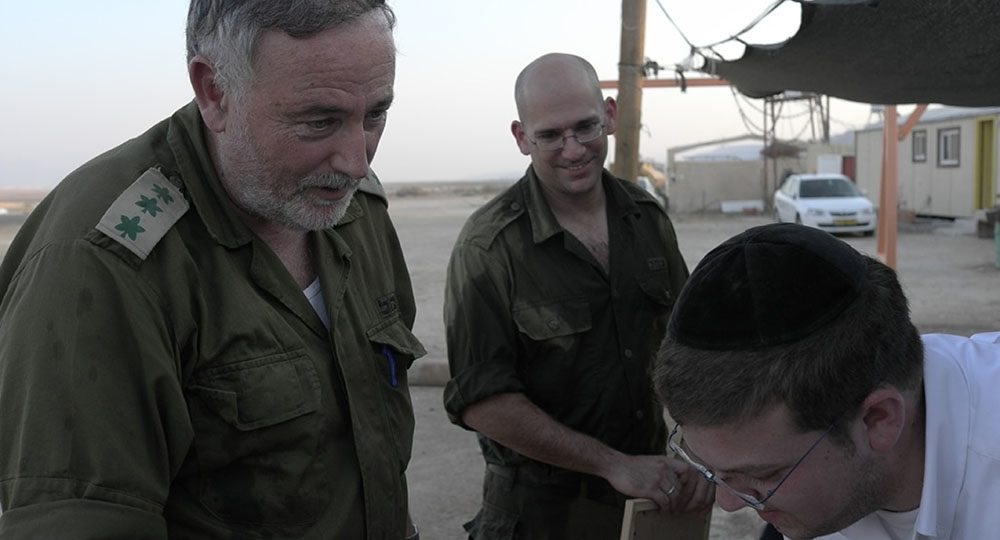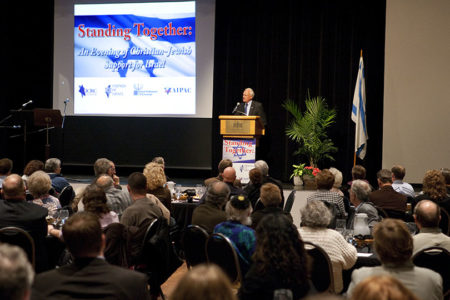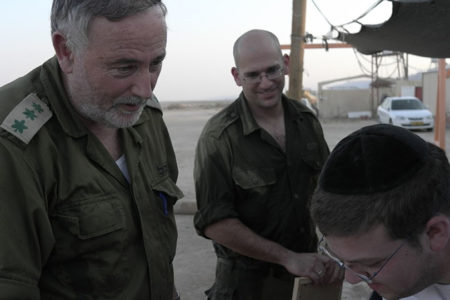Inside the IDF: The Most Humane Army in the World
Situation 1. Your mission is to bomb a house in enemy territory occupied by known terrorists. Inside they have stockpiled an enormous cache of munitions solely for use against your country. Seconds before you drop the bomb, you notice from your airplane that people are gathering on the roof. What do you do?Do you bomb the house and risk killing the people? Do you abandon the mission? You have eight seconds to decide.
Situation 2. Your mission is to fire a missile and destroy a jeep driving a group of known terrorists who have already murdered many of your countrymen. Suddenly the jeep begins to turn into the enclosed carport of a building in enemy territory. You know nothing about the building. Is it a school? A nursing home? Who is inside? What do you do? Do you bomb the vehicle and risk killing the people inside? Do you abandon the mission? You have eight seconds to decide.
Situation 3. Your mission is to kill a known terrorist in enemy territory who is fleeing with his AK-47 assault rifle. He spots you. Suddenly he runs over to a group of children wearing backpacks who look like they’re waiting for a school bus. With his right hand, he randomly snatches a little boy by the back of the shirt collar with such force that he jerks him off the ground. AK-47 in one hand, child in the other, he runs for cover into a crowd, using the child to shield himself. What do you do? Do you shoot and risk killing the child? Do you abandon the mission? You have fewer than eight seconds to decide.
All these are real-life situations the Israeli military faces every day. And in each case, Israeli soldiers go to unheard-of lengths to prevent harming Palestinian civilians. In fact, more than 600 people saw actual film footage of all three situations and more in a presentation by Israeli Col. Bentzi Gruber who spoke at The Friends of Israel headquarters in New Jersey and at The Friends of Israel’s Winona Lake Prophecy Conference in Winona Lake, Indiana, in July.
Gruber, a tall, well-spoken, handsome man in his 50s, is married with five children. He is a computer engineer working on his doctoral thesis in behavioral science. But in Israel, few men have the luxury of being civilians. In a country as small as New Jersey, a scant six miles separate Samaria (West Bank) and the Mediterranean Sea. Furthermore, 600 million Muslims surround Israel’s 5.6 million Jews. So Israel must always fight to protect itself from well-armed enemies sworn to its destruction.
Gruber is a 30-year career veteran with the Israel Defense Forces (IDF). He has 20,000 soldiers under his command, has seen much combat, and knows first-hand how diligently Israel protects enemy noncombatants despite news reports that paint the Israelis as murderers. In an effort to get the truth out, he put together a presentation, “Ethics in the Field,” using aerial footage shot from Israeli airplanes and, in many cases, film shot by the Palestinians themselves who regularly video suicide bombers leaving on their missions.
“We don’t want to kill civilians,” Gruber said. So prior to situation 1, where a building in Gaza was the target, the IDF dropped thousands of leaflets in various languages 48 hours in advance of the strike, telling the Palestinians when the building would be bombed and to evacuate. Then the Israelis made telephone calls and sent text messages. Usually they obtain the numbers of most people in the neighborhood. This is standard Israeli procedure.
“It’s unthinkable,” said Gruber, “for an army to tell the enemy in advance when you are going to attack. But we do it to avoid collateral damage. We risk our own lives to protect the Palestinians.”
However, the Palestinians have figured out a way to take advantage of Israel’s mercy. When the hour for the attack approaches, they gather on the roof of the targeted building, knowing the IDF will then not bomb it. So Israel invented a procedure called “knocking on the roof.” It shoots a rocket at the roof’s edge as a warning that the big bomb is coming next. Then the Palestinians scatter.
In situation 2, when the jeep filled with terrorists detoured into the carport, the Israeli soldier in charge had eight seconds to divert the rocket; it exploded in a barren area. “This happens hundreds of times,” Gruber said. The terrorists got away.
“We are taking the risk,” he said. “The goal isn’t to kill for what some-one did in the past, but to prevent him from doing something in the future.”
In situation 3, the terrorist who grabbed the little boy also got away. When terrorists know they are being pursued through the streets, “they send [Palestinian] kids outside to play football [soccer] because they know we won’t shoot,” Gruber said.
He explained that Israel has two main rules with regard to collateral damage: (1) use force only to accomplish the mission and (2) don’t harm the innocent—meaning women, children, civilians, and noncombatants.
However, determining who is a non-combatant is not always easy. The Palestinians, Gruber said, purposely wear jeans, T-shirts, and anything else
that makes them indistinguishable with-in a crowd. They don’t dress like soldiers, as the Israelis do. Furthermore, when one gets killed or injured, another quickly snatches away the weapon to make it look as though the IDF shot an unarmed civilian. It’s all there on film.
Gruber also showed footage of what looked like an ordinary bathroom in a home in the Gaza Strip until IDF soldiers removed the sink’s cabinet, exposing a well-concealed tunnel and hundreds of explosives, including liquid TNT. The residents also took advantage of the leaflet drop and used the 48 hours advance notice to booby-trap the kitchen.
Smuggling-tunnels, Gruber said, are big business. Four families in Rafah, located in the southern part of the Gaza Strip, own 900 tunnels so big the Palestinians drive through in trucks and jeeps, smuggling weapons. “They are like the Holland Tunnel” in New York City, he said.
Gruber also showed film of a clearly marked UN ambulance with two terrorists already inside. Seven more climbed in with their weapons. He said the UN has a yearly budget of $1.3 billion in Gaza, and from it came the ambulance driver’s salary and the funds to maintain and gas up the vehicle.
“We send everything to Gaza,” Gruber said, “including food and medicine. Thirty-five percent of the electricity in Gaza comes from our power station in Ashkelon [Israel], which they try to hit every day with their rockets.”
Unfortunately, being in a constant state of semi-war is taking its toll. Yet the tiny Jewish state will not compromise its principles or stoop to the level of the terrorists. Col. Gruber said post-traumatic stress is a serious problem, and the nation loses 45 soldiers a year to suicide—that would be the equivalent of 2,500 American soldiers. Most had unavoidably caused collateral damage and could not live with the memory. “When you kill an innocent person, you carry that person on your back for the rest of your life,” Gruber said.
In fact, Col. Gruber has founded an organization called Chesed (Hebrew for “lovingkindness” or “mercy”) in the Field that brings together IDF soldiers and the terminally ill or disabled for experiences that educate and inspire. “When our soldiers are good people, that is when we have a strong army and secure country,” he says on his website, bentzigruber.com.
Gruber has spoken at Harvard, the University of California at Berkeley, and at a host of other American universities that are overtly unfriendly to Israel. Yet he continues to bring his message. “When you hear the lies, you need courage to stand up.”
“It is a privilege for me,” he said, “to be in the army to protect my family, to protect Israel, and to protect the Western world.”







